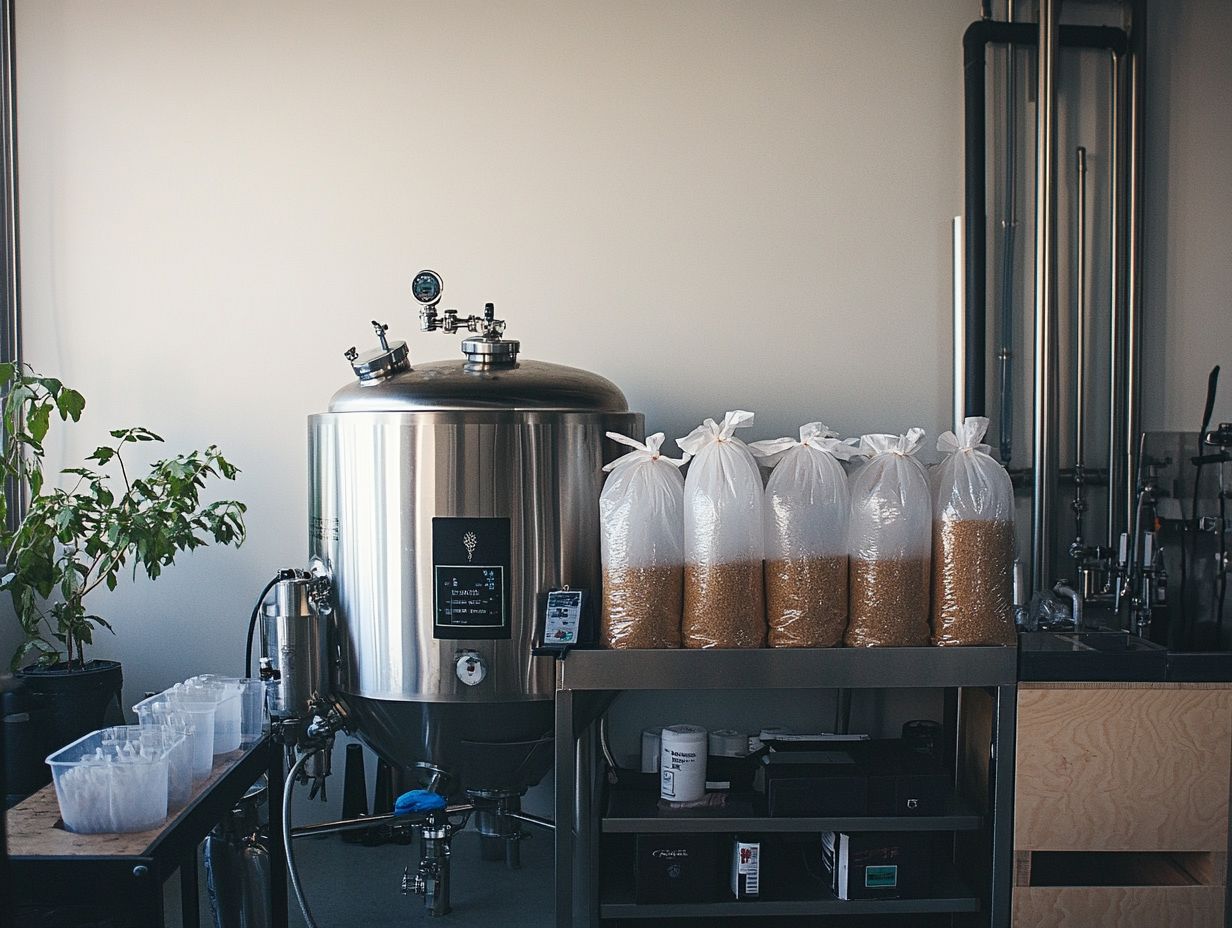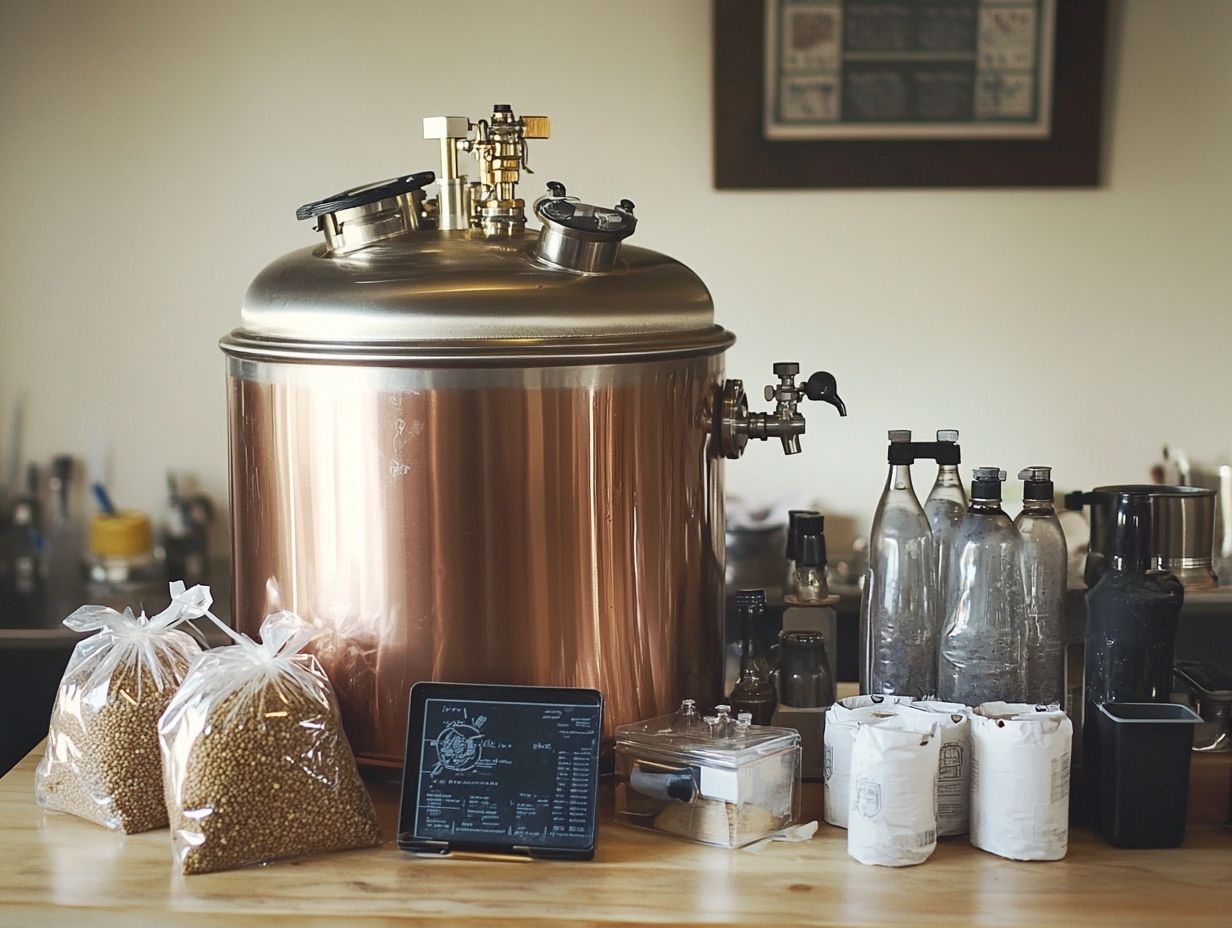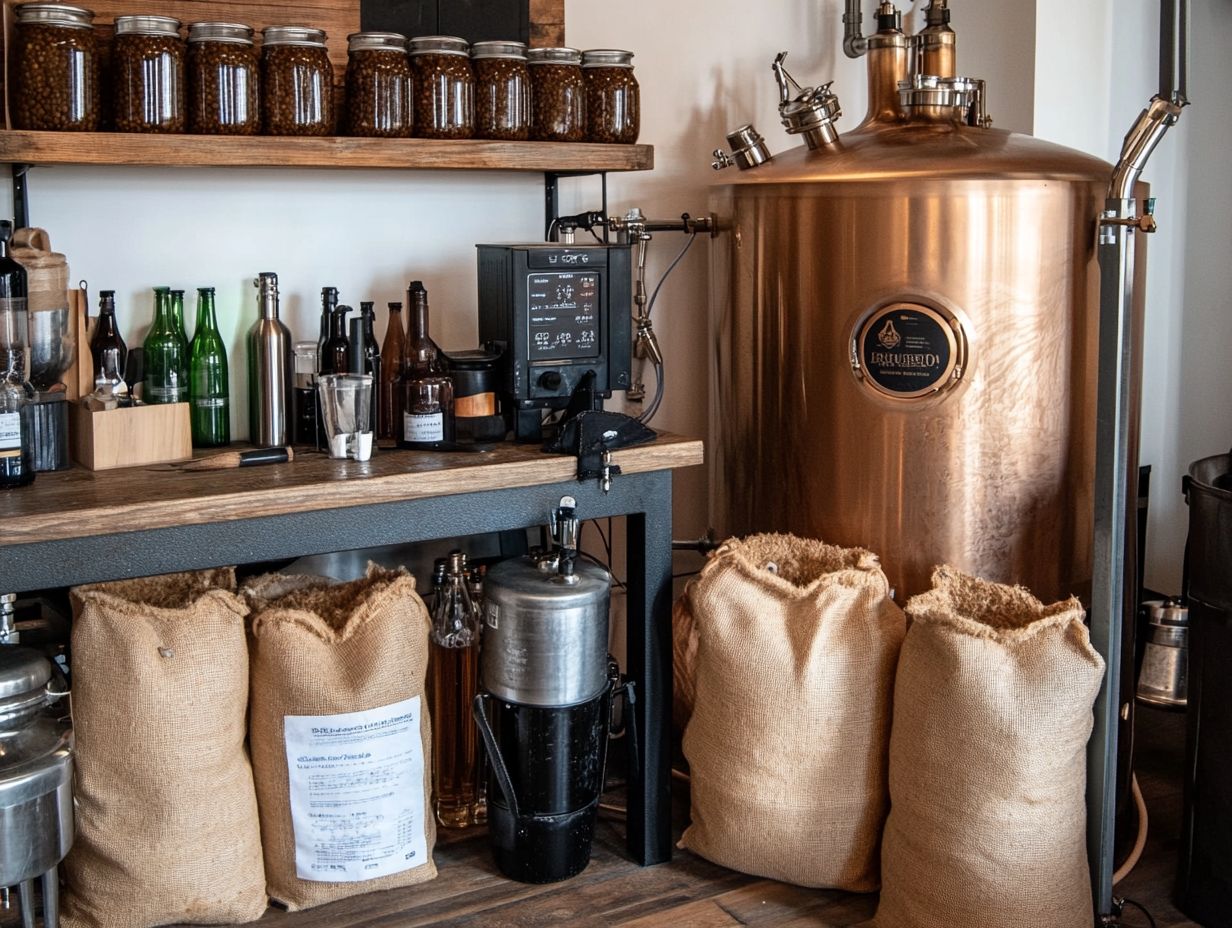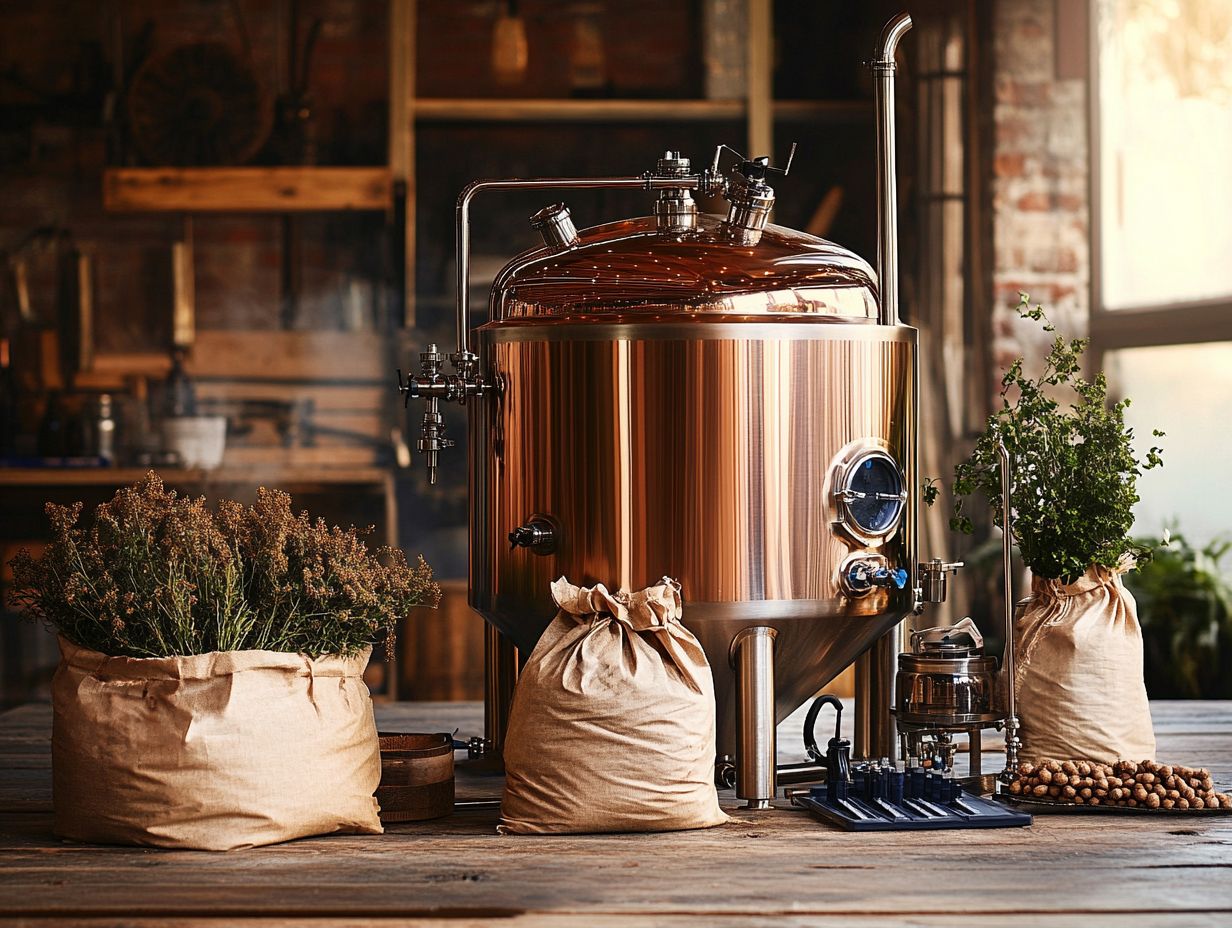The Effects of Water Quality on Brewing
Water quality is essential in brewing, as it significantly influences not just the taste of the beer but also its overall character. From the different minerals in the water to its source, every detail can profoundly alter the final product. Understanding the types of water sources, such as hard water and soft water, is crucial in achieving the desired flavor.
Discover how water quality can transform the flavor of your beer! This article examines how water quality impacts beer flavor, discussing the key components necessary for brewing and the distinctions between different water sources. It also provides guidance on testing and adjusting water quality, including the use of water treatment methods and filtration systems, to ensure your brews reach their full potential.
Whether you re a seasoned brewer or just embarking on your brewing journey, grasping these elements will undoubtedly enhance your brewing experience.
Contents
- The Importance of Water Quality in Brewing
- What Are the Other Factors That Affect the Taste of Beer?
- Understanding Water Quality for Brewing
- The Effects of Different Water Sources on Brewing
- Conclusion
- How Does Spring Water Affect Brewing?
- How to Test and Adjust Water Quality for Brewing
- What Are the Common Methods of Testing Water Quality for Brewing?
- How Can You Adjust Water Quality for Brewing?
- Frequently Asked Questions
- What is water quality and why is it important for brewing?
- What are some key factors of water quality that affect brewing?
- How does pH level impact the brewing process?
- What role do minerals play in brewing and what minerals are important?
- How does dissolved oxygen impact the brewing process?
- How can contaminants in water affect the quality of beer?
Key Takeaways:

- Water quality plays a crucial role in the taste of beer.
- The key components of water for brewing include minerals, pH level, and hardness.
- Different water sources, such as tap water, well water, and spring water, have varying effects on the brewing process and final product.
The Importance of Water Quality in Brewing
Water quality plays a crucial role in the brewing process, significantly impacting the flavor, aroma, texture, and overall quality of the beer you produce. Factors such as mineral content, pH level, and any contaminants present, including chlorine and chloramine, in your municipal or well water can dramatically alter the taste profile of your craft beers.
Understanding how these variables interact is essential for you as a brewer striving to create exceptional beers that resonate with consumers. After all, water is the primary ingredient in most brewing styles, making up to 95% of the final product. Therefore, never underestimate the importance of water quality and effective water management in the intricate art of brewing.
How Does Water Quality Affect the Taste of Beer?
Water quality is fundamental in shaping the taste of beer, as the mineral content and pH level can significantly influence the flavor profile of your final brew. Even the smallest changes in ions present in the water can lead to noticeable differences in the final product.
Each mineral you incorporate contributes its own unique touch to the brewing process. For instance, calcium enhances both the clarity and stability of your beer while promoting enzyme activity during mashing. Magnesium, often added in the form of Epsom salts, plays a vital role as a cofactor for yeast, facilitating fermentation like a well-timed dance partner. Sodium can elevate sweetness, making it especially advantageous in darker, malt-forward styles, while chloride lends a smoother mouthfeel, essential for crafting balanced ales. On the flip side, sulfate, sometimes introduced using gypsum, can amplify the bitterness of hops, a crucial element for hoppy lagers and IPAs.
Unlock the full potential of your brews by adjusting these mineral levels. You have the power to craft a delightful array of beer styles, from crisp, clean pilsners to rich, robust stouts. This illustrates just how profoundly water chemistry impacts the art of brewing.
What Are the Other Factors That Affect the Taste of Beer?
While you might think water quality takes center stage in brewing, don t overlook the equally important elements at play malt, hops, yeast, and fermentation techniques. All these factors contribute significantly to the final taste and quality of your beer. The use of high-quality barley as a source for malt can make a substantial difference in the final product.
Malt brings sweetness and body to the mix. Various grains offer distinct flavors that can range from biscuity to chocolatey, thanks to the process of heating grains to develop flavors.
In terms of hops, the choices you make can infuse your brew with a bouquet of floral, citrus, or earthy notes. This enhances both aroma and bitterness to perfectly balance the malt’s sweetness.
Let s not forget yeast, often the unsung hero of brewing. Different yeast strains do more than just ferment sugars. They produce esters and phenols that lend delightful fruity or spicy nuances to your beer.
The brewing techniques you employ like the mash temperature, wort aeration, and fermentation conditions work in harmony with the mineral composition of your water to shape flavors.
This combination leads to an astonishing array of beer styles, each crafted to satisfy a diverse range of palates. By mastering these elements, you can create exceptional brews that will impress your friends and elevate your brewing game!
Understanding Water Quality for Brewing
Understanding the intricacies of water quality is essential for you as a brewer. Different water sources whether municipal, well, or spring come with their own unique mineral compositions and pH levels. Each of these can significantly impact the brewing process and the flavor profile of your beer. Environmental factors and water supply issues can also affect the quality and availability of these water sources.
For example, if your water has a high calcium content, it can boost the efficiency of your mashing. On the other hand, water that is abundant in sulfates can enhance the bitterness of your hops.
Familiarizing yourself with appropriate water treatment methods will enable you to achieve optimal water quality tailored to your specific brewing style. By mastering these elements, you ll refine your craft and create exceptional beers that truly stand out in the competitive brewing landscape.
What Are the Key Components of Water for Brewing?

Key components of water that are essential for brewing encompass various minerals, pH levels, and overall water quality. Each significantly influences both the brewing process and the taste of the final product.
Minerals such as calcium, magnesium, sodium, chloride, and sulfate are crucial for creating the perfect brewing environment. Calcium not only supports yeast health but also enhances clarity. Magnesium plays a vital role in enzymatic reactions during mashing.
Sodium and chloride work together to elevate the water’s mouthfeel and sweetness, whereas sulfate amplifies hop bitterness, potentially transforming the beer’s character altogether.
It’s imperative that you maintain an optimal pH level during mashing, typically ranging from 5.2 to 5.5. This directly impacts enzyme activity, sugar extraction, and ultimately, the fermentation process. By diligently monitoring water quality throughout the brewing journey, you can ensure a consistent and high-quality final product that truly shines.
What Are the Ideal Levels of These Components for Brewing?
The ideal levels of key water components for brewing hinge on the specific beer style you re producing. Certain minerals and pH levels favor different processes.
Take lighter beer styles like pilsners, for example; they thrive with low sulfate levels that promote a smooth, malt-forward taste. If you re crafting hop-forward IPAs, you ll want to boost those sulfate concentrations to enhance bitterness and aroma.
To refine your water profiles, conduct regular tests to pinpoint the precise mineral content and pH levels. These factors can significantly influence the overall flavor and mouthfeel of your finished brew.
By making informed adjustments, like adding specific salts such as gypsum or Epsom salts, you can achieve the desired taste and ensure that each batch stands out. Ultimately, grasping and managing water quality is crucial for anyone striving to create consistent, high-quality beers.
Consider testing your water or experimenting with different brewing techniques to see the impact on your beer!
The Effects of Different Water Sources on Brewing
Water quality is crucial in brewing, significantly affecting the final beer product. Different water sources have unique characteristics that influence this process. For example, tap water often contains chlorine or chloramine, which can introduce off-putting flavors if not treated. Many brewing industries use tap water, optimizing it with appropriate management techniques.
Well water may have a high mineral content depending on regional geology, while spring water varies widely in purity and mineral composition. Understanding these differences is vital for brewers who want to optimize their water sources and craft exceptional beers. For instance, brewers at Maumee Bay Brewing Co. in Ohio and in the Poconos, Pennsylvania, have effectively used local water sources to create distinctive flavors in their craft beers.
How Does Tap Water Affect Brewing?
Tap water is common in both homebrewing and commercial breweries, and it can greatly affect how you brew. Potential contaminants like chlorine and chloramine can lead to undesirable off-flavors in the final product. High pH levels in tap water may also negatively impact the brewing process.
You will find that these substances not only compromise taste but also disrupt yeast activity during fermentation, which isn’t ideal. Many brewers combat these challenges with effective treatments such as activated carbon filtration or reverse osmosis systems, removing these unwelcome chemicals from their water.
Some breweries enhance their water by adding specific minerals to achieve a water profile that elevates the beer’s flavor. A prime example is the esteemed Brooklyn Brewery, which uses a sophisticated water treatment system to ensure purity. Similarly, the innovative Sierra Nevada focuses on careful management of water quality, a key factor in crafting their award-winning brews.
The Ohio Environmental Council emphasizes the importance of water quality in maintaining the integrity of craft beer produced near Lake Erie. By implementing these strategies, you can ensure your water meets the highest standards, resulting in a superior final product that reflects your dedication to the craft.
How Does Well Water Affect Brewing?
Well water presents a remarkable opportunity for brewers, with its mineral content shaped by the geological nuances of the surrounding area. When managed thoughtfully, it can significantly enhance your brewing process. However, it’s crucial to regularly test well water for contaminants and consider seasonal variations in quality.
This natural resource is often rich in beneficial minerals like calcium, magnesium, and sulfur, which can greatly influence the flavor profiles and mouthfeel of different beer styles. Remember, the quality of well water can vary considerably based on local geology and environmental factors. Regular testing is essential to ensure that your water remains safe and optimal for brewing.
Some notable breweries have seized this opportunity, tailoring their recipes to showcase the unique characteristics of their well water. This approach creates distinctive products that resonate with consumers. For example, certain microbreweries embrace the rich mineral content of their well water while implementing filtration systems to tackle potential contaminants, ensuring both quality and safety in their brewing processes.
Conclusion
In summary, the quality of water used in brewing is fundamental. By understanding the effects of different water sources, such as tap and well water, brewers can significantly improve their beer quality. Paying attention to water treatment and management will help you craft better beers that stand out in the market.
How Does Spring Water Affect Brewing?

Spring water is often cherished by brewers for its remarkable purity and mineral content. The mineral content varies by the spring’s location, offering unique flavor profiles that can enhance specific beer styles. This transformation makes your brew truly special.
Sourced from underground aquifers, spring water undergoes a natural filtration process as it winds through layers of rock and soil. This journey enriches the water with essential minerals such as calcium, magnesium, and potassium. These minerals play critical roles in the brewing process. While the consistent flow of spring water is vital for brewing, challenges can arise, particularly during dry seasons. Variations in mineral composition can significantly impact both the brewing process and the final taste of your beer.
Renowned breweries like Sierra Nevada and New Glarus have successfully harnessed their unique spring water to craft award-winning beers. These breweries showcase the distinct profiles that spring waters contribute. Every sip transports you to the heart of the spring, celebrating its unique character!
How to Test and Adjust Water Quality for Brewing
Testing and adjusting water quality is crucial for brewers to ensure that the water used in your brewing process meets the essential standards for crafting high-quality beer.
There are several methods for evaluating water quality, including:
- Assessing mineral content: Check the various minerals present in your water.
- Measuring pH levels: Determine how acidic or basic your water is.
- Identifying potential contaminants: Ensure your water is free from harmful substances.
Once your analysis is complete, you can implement suitable treatment processes, whether through filtration, adding necessary minerals like Epsom salts or gypsum, or adjusting alkalinity the water’s ability to neutralize acids to create the ideal conditions for brewing.
What Are the Common Methods of Testing Water Quality for Brewing?
In terms of testing water quality for brewing, you have a range of methods at your disposal, including home testing kits, laboratory analyses, and professional water testing services. Each approach helps you assess the presence of contaminants and the mineral composition essential for brewing.
Consider the unique advantages and disadvantages of each method carefully. Home testing kits offer a convenient and budget-friendly way to perform quick assessments, allowing you to check parameters like pH and hardness whenever it suits you. However, while they provide immediate results, these kits may not match the precision of laboratory analyses, which can examine a wider array of elements and yield more accurate data. If you re a serious brewer looking for comprehensive insights, professional water testing services are the way to go, although they typically come with a heftier price tag and longer turnaround times.
As you delve into water quality, key parameters to monitor include hardness, alkalinity, and pH, along with crucial minerals like calcium, magnesium, and sulfate. Understanding these test results equips you with actionable insights, allowing you to make informed adjustments to your water profile. This ensures optimal conditions for fermentation and enhances flavor development in your brews.
How Can You Adjust Water Quality for Brewing?
Adjusting water quality for brewing requires you to employ treatment methods that modify mineral content and pH levels. This ensures your water aligns perfectly with the desired profile for optimal brewing results.
Among the various treatment methods available, reverse osmosis emerges as a standout option, capable of removing impurities and providing you with a clean slate. Filtration systems also play a crucial role, eliminating specific unwanted elements while preserving the beneficial minerals that contribute to your brew s character.
As a brewer, consider adding particular minerals tailored to your brewing needs. For instance, calcium sulfate can enhance the crispness of your pale ales, while magnesium lends a smooth mouthfeel to your stouts. Understanding how these minerals interact allows you to fine-tune your water profile, ultimately elevating the quality of your beer and enriching your entire brewing experience.
Frequently Asked Questions
What is the importance of water quality in brewing?
Water quality is crucial in brewing because it directly affects the flavor, aroma, and overall character of the beer. Different minerals and pH levels in water can enhance or detract from the brewing process.
Consider experimenting with your own water quality and learn about the role of water quality in brewing to share your brewing experiences and enhance your journey in crafting exceptional beers!
What is water quality and why is it important for brewing?

Water quality refers to the chemical, physical, and biological properties of water. It is crucial for brewing because water makes up more than 90% of beer. This can significantly impact the taste, aroma, and overall quality of the final product.
What are some key factors of water quality that affect brewing?
The key factors of water quality that affect brewing include pH level, mineral content, dissolved oxygen, and contaminants such as chlorine and chloramines.
How does pH level impact the brewing process?
The pH level of water can greatly affect the enzymatic activity, which is the process where enzymes help convert starches into fermentable sugars, during mashing. A pH level outside of the optimal range (5.2-5.6) decreases sugar extraction and affects the beer’s flavor.
What role do minerals play in brewing and what minerals are important?
Minerals in water can affect flavor, mouthfeel, and clarity of beer. Important minerals for brewing include calcium, magnesium, and sulfate, as they contribute to yeast health, pH balance, and hop bitterness, respectively.
How does dissolved oxygen impact the brewing process?
Dissolved oxygen (DO) is vital for yeast health and fermentation. Too much DO can lead to off-flavors and shorter shelf life. On the other hand, too little DO can result in slow or stuck fermentation. Controlling DO levels during brewing is crucial for achieving the best flavors and fermentation results.
How can contaminants in water affect the quality of beer?
Contaminants such as chlorine and chloramines can negatively impact the flavor and aroma of beer. Chlorine can impart a medicinal taste, while chloramines can create a phenolic or plastic-like flavor.
Don’t underestimate the impact of contaminants properly filtering your water can transform your brewing experience!





